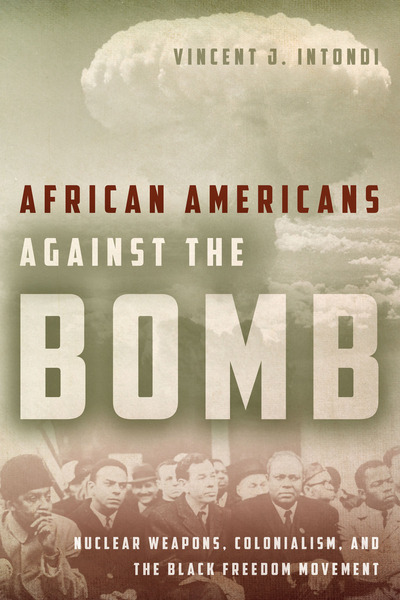Since Donald Trump became president, many of us in the disarmament community have warned about Trump’s desire to use nuclear weapons. We have witnessed Trump threaten the destruction of North Korea, express a desire to resume nuclear testing, and recommend other countries develop their own nuclear arsenals. The fear of Trump starting a nuclear war only got worse with the release of his new security strategy, Nuclear Posture Review, and budget in which the administration called for more money to be spent on nuclear weapons, while the U.S. “broaden its use of nuclear weapons” to include using them to counter “non-nuclear strategic attacks.”
Trump’s policies, however, are not entirely new. Similar to Trump, when Ronald Reagan came into office, he called for a substantial nuclear buildup while dramatically cutting spending on social programs that largely benefited the poor and black communities. As a result, a re-energized nuclear disarmament movement emerged, with significant resistance coming from the black community, including politicians.
Harold Washington, who became the first black mayor of Chicago in 1983, routinely spoke out against nuclear weapons and voted against nuclear proposals, often in the face of the local Chicago “machine.” Washington was especially active in debates concerning nuclear power since Illinois, at the time, had more nuclear power plants than any other state in the nation. During his mayoral campaign, Washington argued that a nuclear freeze would release billions of dollars that could be used for the economic and social needs of the city. Once elected, Washington continued to speak at antinuclear rallies and was honored by the Chicago Peace Council for his antinuclear efforts.
In the summer of 1982, the National Conference of Black Mayors (NCBM) gathered in Birmingham, Alabama to discuss the nation’s economy. Following the meeting, the group concluded that there was a direct link between President Reagan’s cutbacks in programs for their cities and the buildup of nuclear weapons. The mayors opposed nuclear proliferation and suggested that the billions of dollars allocated for the arms race be spent on building new hospitals and schools.
Jesse Jackson dedicated a substantial portion of his presidential campaign in 1984 to the nuclear arms race. Peace activists who supported Jackson contended that he was the only candidate to effectively link peace with social justice, which they defined as “the lynchpin of a genuine and lasting peace.” The National Campaign for No-First-Use of Nuclear Weapons maintained that Jackson’s representatives were among the strongest advocates of a no-first-use policy. In fact, not many presidential candidates before or after Jackson have demonstrated such a strong antinuclear platform.
Perhaps no congressman, white or black, fought more vehemently against Reagan’s nuclear policies more than the co-founder of the Congressional Black Caucus (CBC), Ronald Dellums (D-CA). Indeed, Dellums made stopping the production of the MX missile, a heavyweight ICBM, which carried 10 nuclear warheads, his personal crusade. The Carter administration originally proposed plans for the MX missile, and in 1980, with support from representatives Charles Rangel (D-NY), Shirley Chisholm (D-NY), and John Conyers (D-MI), Dellums put forth an amendment to cut the $1.6 billion. Two years later, Dellums was again fighting to stop development of the MX missile, this time under the Reagan administration.
Dellums introduced an alternative appropriations bill, which reduced the military budget by more than $50 billion. Since the military was planning on making Utah the headquarters for the MX missile, Dellums traveled to the state and met with Spencer Kimball, head of the Mormon church. Following their meeting, the Mormon church announced its decision to formally oppose the MX missile, citing many of the same reasons that Dellums had mentioned to Kimball.
To combat the Reagan administration’s plans to increase the number of nuclear weapons, the CBC put forth an alternative budget that called for the elimination of the MX missile, as well as the Trident and Trident II missiles, Pershing II missile, Cruise missiles, and anti-satellite weapons. While the CBC’s proposals were defeated, their efforts, along with pressure from antinuclear groups, resulted in Congress blocking all funding for production of the MX missile in December 1982. Lawrence Wittner, who has written extensively on the nuclear disarmament movement, argues that this was a stunning defeat—the first time in the postwar era that Congress had refused any president a major nuclear weapon.
The next day, however, the House of Representatives voted by a massive margin of 346 to 68 to accept a military appropriations bill of $230 billion, which would be used in part to research and develop the MX missile. The battle to stop the MX missile continued throughout the next three years, and by 1985, following multiple attempts by the Reagan administration, a measure for the production of the MX missile passed. However, the administration had to agree to cut the number of missiles from 200 to 50. Opponents of the MX missile regarded this as a victory. President Reagan viewed it as a defeat.
If we are going to halt President Trump’s march toward nuclear war, we will have to develop a movement much like we saw in the 1980s when 1 million people marched for nuclear disarmament. It will have to include activists, citizens, musicians, journalists, artists, and yes, politicians. Black politicians led on the issue before. We need new leaders like Cory Booker, Kamala Harris, and others to raise their voices, follow in their predecessors’ footsteps, and use their power to ensure Trump does not use nuclear weapons. Many of these same members of Congress have demonstrated throughout their careers courage and leadership in fighting for justice and equality, but as Dr. King warned in 1959, “What will be the ultimate value of having established social justice, where all people are merely free to face destruction by atomic war?”
Vincent Intondi is an associate professor of history at Montgomery College and author of the book, African Americans Against the Bomb: Nuclear Weapons, Colonialism, and the Black Freedom Movement.

